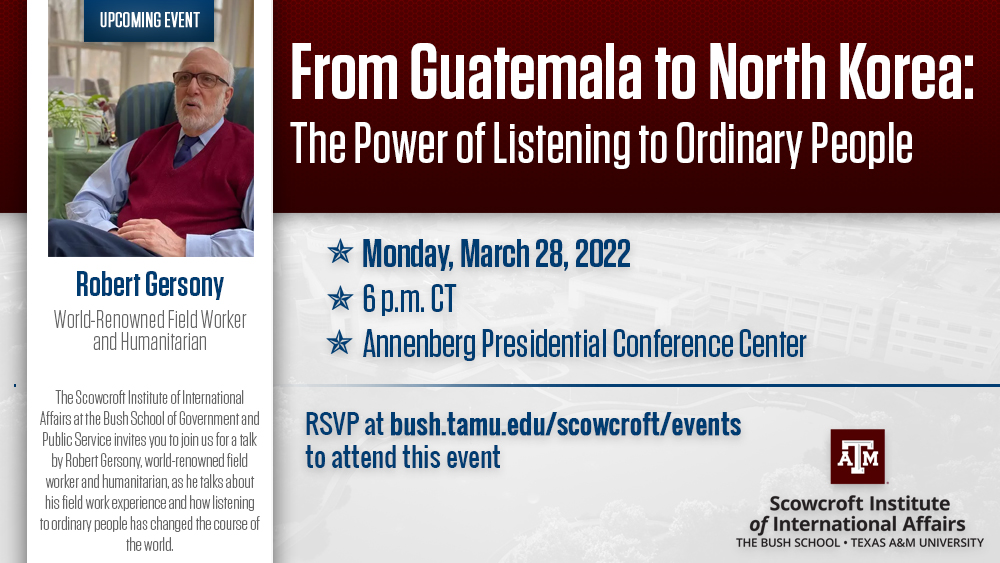
The Scowcroft Institute of International Affairs at the Bush School of Government & Public Service at Texas A&M University will host distinguished humanitarian Robert Gersony on March 28, 2022. He will talk about his field work experience and how listening to ordinary people has changed the course of the world.
The event will be held at the Annenberg Presidential Conference Center (1002 George Bush Dr. W. College Station, TX 77843). Registration is required; sign-in begins at 5:30 p.m. in the lobby and the lecture starts at 6 p.m. There will be time for a Q&A after. Register online to attend.
Robert Gersony’s Biography
Robert (Bob) Gersony is a field worker who for over forty years has conducted more than 50 in-depth assessments of civil conflicts and emergencies in as many countries throughout the world. His work has taken him to Guatemala, Rwanda, Bosnia, Mozambique, Somalia, Uganda, Nepal, Iraq, Colombia, Nicaragua, the North Korean border, Gaza and the West Bank and scores of other international flashpoints. It is the subject of a recent biography by Robert Kaplan, entitled The Good American: The Epic Life of Bob Gersony, the U.S. Government’s Greatest Humanitarian.
His methodology involves in-depth listening to hundreds of ordinary people, the victims of conflict, in scores of locations for each study. His briefings have influenced the highest level policymakers, often changing their perceptions and altering or strengthened U.S. policy to the advantage of humanitarian as well as U.S. national interests.
Robert Gersony: An Inspiration to Robert Kaplan
Gersony’s work is the inspiration behind New York Times bestselling author Robert Kaplan’s The Good American: The Epic Life of Bob Gersony, the U.S. Government’s Greatest Humanitarian. The following is the book’s description as seen in the Penguin Random House edition:
“In his long career as an acclaimed journalist covering the “hot” moments of the Cold War and its aftermath, bestselling author Robert D. Kaplan often found himself crossing paths with Bob Gersony, a consultant for the U.S. State Department whose quiet dedication and consequential work made a deep impression on Kaplan.
Gersony, a high school dropout later awarded a Bronze Star for his service in Vietnam, conducted on-the-ground research for the U.S. government in virtually every war and natural-disaster zone in the world. In Thailand, Central and South America, Sudan, Chad, Mozambique, Rwanda, Gaza, Bosnia, North Korea, Iraq, and beyond, Gersony never flinched from entering dangerous areas that diplomats could not reach, sometimes risking his own life. Gersony’s behind-the scenes fact-finding, which included interviews with hundreds of refugees and displaced persons from each war zone and natural-disaster area, often challenged the assumptions and received wisdom of the powers that be, on both the left and the right. In nearly every case, his advice and recommendations made American policy at once smarter and more humane—often dramatically so.
In Gersony, Kaplan saw a powerful example of how American diplomacy should be conducted. In a work that exhibits Kaplan’s signature talent for combining travel and geography with sharp political analysis, The Good American tells Gersony’s powerful life story. Set during the State Department’s golden age, this is a story about the loneliness, sweat, and tears and the genuine courage that characterized Gersony’s work in far-flung places. It is also a celebration of ground-level reporting: a page-turning demonstration, by one of our finest geopolitical thinkers, of how getting an up-close, worm’s-eye view of crises and applying sound reason can elicit world-changing results.”

